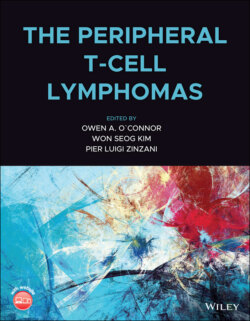Читать книгу The Peripheral T-Cell Lymphomas - Группа авторов - Страница 61
Isocitrate Dehydrogenase Inhibitors
ОглавлениеIsocitrate dehydrogenase (IDH) catalyzes the oxidative decarboxylation of isocitrate to α‐ketoglutarate as part of the tricarboxylic acid (or Krebs) cycle. Mutations in either IDH1 or IDH2 lead to the accumulation of 2‐hydroxyglutarate (2‐HG). This metabolite has been shown to inhibit several demethylation pathways, such as those driven by TET or Jumonji proteins, thus indirectly acting as an epigenetic regulator. As a result of 2‐HG accumulation, aberrant DNA or histone methylation can occur [96]. As a consequence of this aberrant regulation, IDH mutations can essentially be viewed as gain‐of‐function mutations and are potentially targetable.
Among lymphoid malignancies, dysregulation of the IDH epigenetic pathway has been best characterized in TCL. The detection of recurrent IDH2 mutations in AITL, especially with substitutions at R172 has suggested a therapeutic target in the treatment of this difficult disease [45, 97]. Whole‐exome sequencing of peripheral TCL samples has demonstrated that approximately 30% of patients with AITL have IDH2 mutations, although such mutations occur less frequently in other subtypes of PTCL [35, 50, 98]. Similar to acute myeloid leukemia (AML), R172 is the most prevalent IDH mutation. It is associated with having the highest levels of 2‐HG compared with the other two hotspot mutations, IDH1R132 and IDH2R140 [97], and should be considered an important biomarker for the selection of patients to receive IDH inhibitors, potentially regardless of tumor histology. Interestingly, according to results published in the past few years, all cells harboring IDH2 mutations are PD‐1+ and are associated with downregulation of Th1 cell‐like differentiation genes (such as STAT1 and IFNG) [35, 50, 98]. Furthermore, an analysis of gene expression signatures demonstrated increased methylation of the promoters that regulate T‐cell receptor signaling and T‐cell differentiation in IDH2R172K cell lines, illustrating a potential mechanism of lymphomagenesis [50]. No data are currently available from preclinical studies testing IDH inhibitors specifically in models of IDH‐mutant lymphomas, such as AITL or chronic lymphocytic leukemia (CLL).
Both the IDH2 inhibitor enasidenib and, subsequently, the IDH1 inhibitor ivosidenib have been approved in the past two years for patients with relapsed and/or refractory AML who carry mutations in IDH2 or IDH1, respectively [99, 100]. Enasidenib (AG‐221), a novel IDH2 inhibitor, has been found to be effective in patients with R/R acute myeloid leukemia who have IDH2 R140 and R172 mutations, leading to its approval in this population [99]. Currently, no results are available from trials of IDH inhibitors in lymphoma. However, clinical trials investigating inhibitors of IDH2 (enasidenib), IDH1 (ivosidenib) and both IDH1 and IDH2 (vorasidenib) in patients with advanced‐stage hematological malignancies are currently underway. Of particular note, enasidenib is currently being investigated in a phase I/II trial specifically for patients with IDH2‐mutated AITL (NCT02273739).
